This UP Los Baños Training Program
is Changing the Lives
of Filipino Farmers
Across the Philippines, the UP Los Baños Farmer-Scientists Training Program continues to train and support farmers as they work to strengthen their harvests and their prospects.
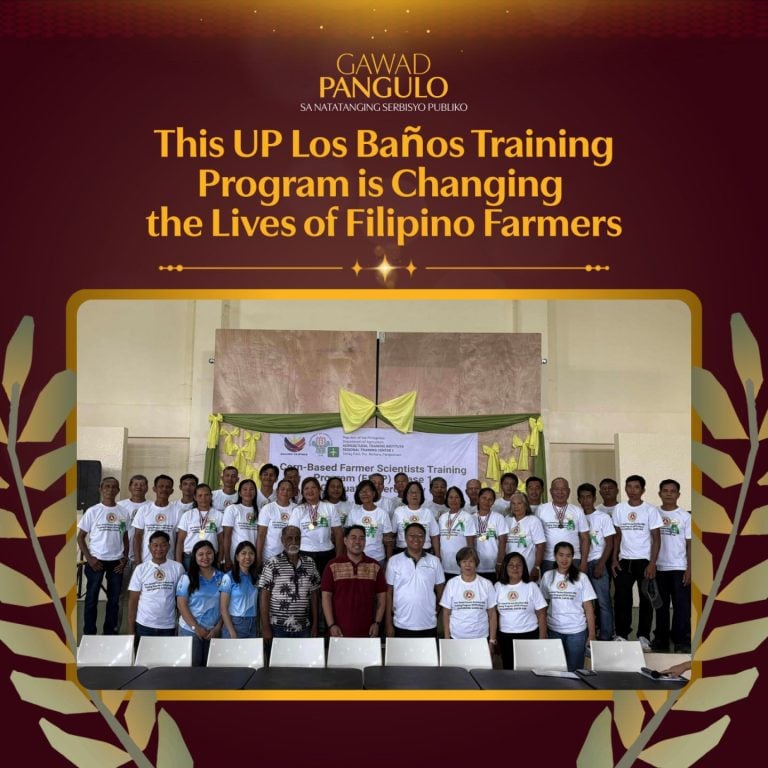
Under the sweltering heat of the sun, upland farmers diligently tend their sprawling cornfields, sweat glistening on their brows. Rows of vibrant green cornstalks stretch out to the sky, swaying gently in the warm breeze. The earthy scent of rich soil mingles with the sweet, fresh aroma of the produce, creating a sensory tapestry that surrounds them. With calloused hands, the farmers carefully inspect their crops for any signs of pests or disease, their faces etched with a mix of determination and pride. In the distance, the rugged hills stand tall, their rocky terrain contrasting against the lush, cultivated fields that signify the hard work and resilience of those unsung heroes who nurture the land. Still, beneath this display of resilience, the numbers reveal a disquieting contrast that underscores how challenging life remains for many Filipino farmers.
In 2022, the agricultural sector (including fisheries and forestry) contributed 8.9 percent of the Philippines’ gross domestic product, the lowest in the past five years. This phenomenon was compounded by the low gross value added of the main food and cash crops, such as palay and sugarcane, though corn products registered significant growth. Despite consistent growth in the agricultural sector between 2018 and 2021, farmers remain among the poorest of the poor, with the highest poverty incidence since 2006. Those living in the uplands, primarily indigenous peoples (IPs), have the highest incidence of poverty. Meanwhile, among the top occupations of households, corn farmers had the highest poverty rates.
- The agricultural sector in the Philippines continues to be characterized by limited diversification and low productivity, amid prevailing issues of high inequality, landlessness, a debt trap, limited policy support and access to services, technology, and infrastructure, as well as the lack of youth and women’s participation in agriculture and its value chains.
Yet amid these sobering statistics, the Farmer-Scientists Training Program (FSTP) of the University of the Philippines Los Baños and its visionary founder stand as one of the ways upland farmers are empowered in both their productivity and dignity.
Also Read:
The Scientist Behind the Public Service
From an early age, Dr. Romulo G. Davide was well aware of the precarious conditions of farmers. Growing up in Argao, Cebu—a 5th-class municipality—the farm was formative to the upbringing of the young Romulo. He often spent his days foraging for food for the family’s carabao and catching shrimps to help feed breakfast to his family of nine.

With his early wake-up call, he studied at the UP Los Baños College of Agriculture (earning his Bachelor of Science in Plant Pathology in 1957), then pursued his master’s and doctorate degrees in nematology and plant pathology in the United States. Throughout his scientific career, he published more than 100 papers on Philippine plant-parasitic nematodes that affect food and cash crops. In addition to these contributions, he developed a biological control agent to combat nematodes, offering Filipino farmers a viable alternative to chemical nematicides. For his pioneering contributions, Dr. Davide was honored by his peers and colleagues with the title, “Father of Plant Nematology.”
In 1994, he received the Gawad Saka Outstanding Agricultural Scientist Award from the Department of Agriculture, which included a cash prize of ₱500,000. He invested this prize money to establish the National Corn-Based Farmer-Scientists Research, Development, and Extension (RDE) Training Program for Sustainable Agriculture Development (FSTP).
- University of the Philippines Los Baños Professor Emeritus
- 2012 Ramon Magsaysay Award recipient
- 2024 National Scientist of the Philippines
“There is no barren land, only barren minds.”
FSTP was driven by the belief that farmers are intelligent and capable individuals and can become scientists in their own right. This idea resonates with a quip Dr. Davide’s father once shared with him: “There is no barren land, only barren minds.”
With the initial funding from Dr. Davide’s modest grant, FSTP was poised to make a significant impact on the lives of Filipino farmers. The program was created through a collaboration between government and non-government agencies, all dedicated to tackling poverty and hunger among small, marginalized farmers.
The initiative empowered these farmers to diversify their crops and integrate livestock into their corn farms, ultimately boosting their income and improving their livelihoods. Through FSTP, farmers are encouraged to take on the role of scientists, working alongside experts to conduct rigorous experiments and develop practical solutions to their day-to-day challenges.
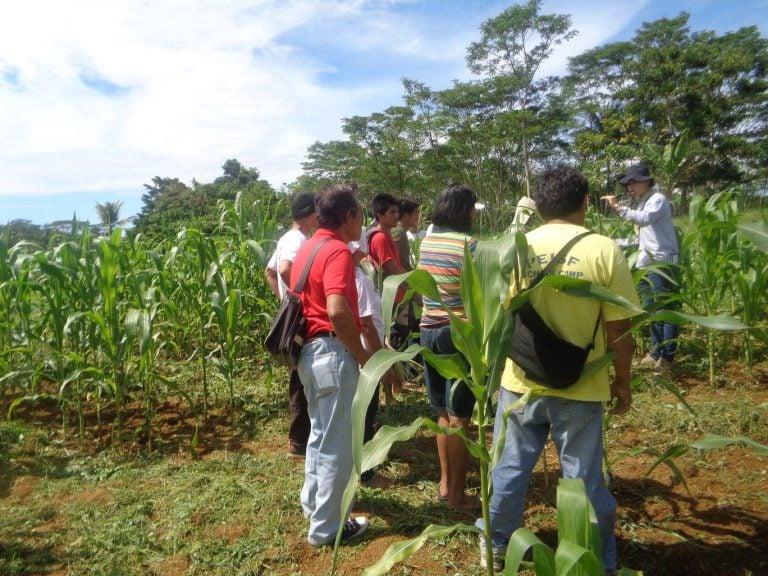
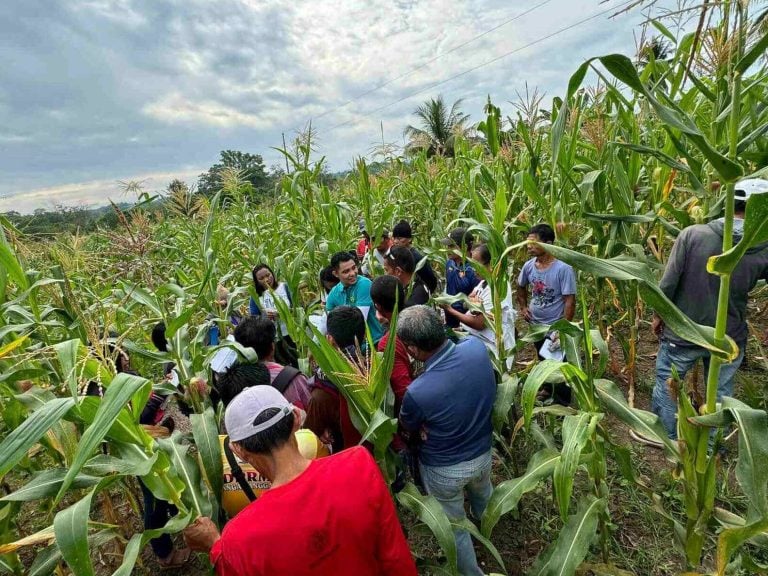
What began in Argao—Davide’s hometown—gradually evolved into something much bigger. From Argao, the FSTP expanded throughout the entire province of Cebu, and eventually reached farming communities in Siquijor, Negros Oriental, Leyte, Occidental Mindoro, and Compostela Valley. By 2008, the program was adopted nationwide through Executive Order No. 710.
The executive order mandated the joint implementation of the FSTP by several key national government agencies, including the Department of Agriculture, the Department of Agrarian Reform, the Department of Environment and Natural Resources, the Department of Science and Technology, the Department of the Interior and Local Government, the University of the Philippines Los Baños, and other state universities and colleges.
Fast forward to 2017: the FSTP stood out among the six distinguished recipients, celebrated during the 1st Gawad Pangulo: Award for Excellence in Public Service. “The award has inspired us to do our job above and beyond the call of duty—travelling many hazardous and dangerous roads or just walking to mountainous [areas] where poor farmers can be reached for the FSTP training,” Dr. Davide reflects. “We have trained the poorest of the poor, [and] indigenous farmers like the Mangyans, Aetas, Blaans, and others.”
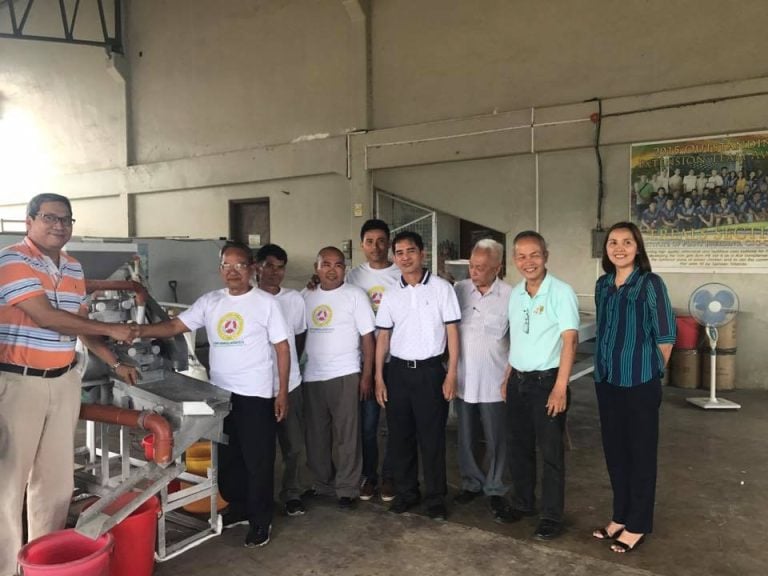
After receiving the Gawad Pangulo award, the FSTP has grown to encompass thousands of barangays, hundreds of municipalities, and numerous provinces nationwide. Even though budget constraints were hampering its implementation, FSTP continues to grow and serve Filipino farmers across the country. “Due to our very limited funds—our core annual budget from the Department of Agriculture-Agricultural Training Institute is only ₱10 million—we can only cover up to two municipalities per region,” Dr. Davide explains.
100,000 Farmer-Scientists and counting
The program’s recognition speaks volumes about its impact. For more than 30 years, FSTP has trained and transformed the lives of countless marginalized farmers—an often-neglected group that grapples with the harsh realities of unfulfilled electoral promises, structural inequalities, and extreme poverty.
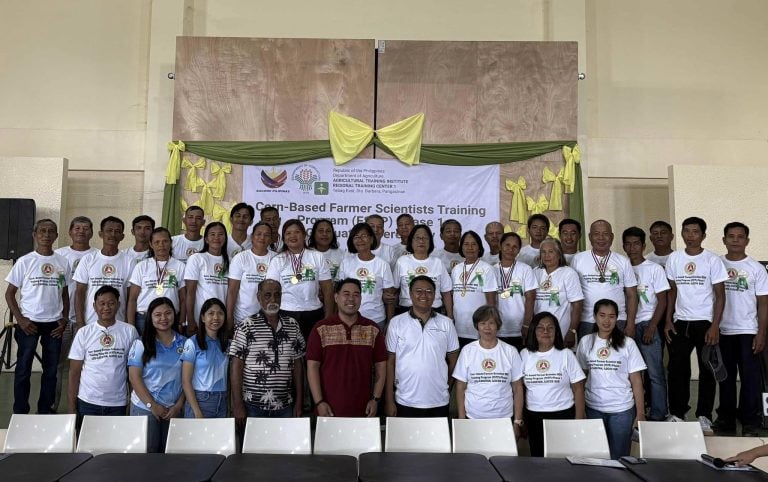
Now, trained farmer-scientists have more than enough food to feed their families, with excess produce making its way to local markets. “We have already trained more than 100,000 farmer-scientists, and we have no reports of hunger problems,” Dr. Davide proudly shares.
“The [Gawad Pangulo] award had a great impact on our activities. It challenged us to be more visible to farmers during their training period to monitor and evaluate their performance, especially in the conduct of the experiments of different trials,” Dr. Davide notes. “After every training, we conduct socio-economic surveys of trained farmer-scientists, where we generally found that our FSTP-trained farmer-scientists have more than enough food to eat, with surplus farming products for sale to local markets.”
Graduates of the program no longer had to worry about providing food for their families. In fact, many farmer-scientists have successfully launched their own businesses, invested in vehicles to transport their produce to local markets, operated sari-sari stores, and settled in comfortable homes. Their children, many of whom now hold degrees in medicine, law, engineering, nursing, and teaching, clearly demonstrate the program’s lasting impact across generations. As for many farmer-scientists, farming has shifted from a daunting struggle to a meaningful pathway toward honor, dignity, prosperity, and enduring opportunities.
“Receiving the award is a great recognition and morale booster for all of us to do more to prove that UP, under the new charter, is truly a national university with an excellent center for public and community extension that serves the Filipino people,” Dr. Davide further elaborates.
FSTP truly embodies what public service means for the University of the Philippines. As Dr. Davide puts it, “In FSTP, UP goes to the people wherever they are, and not the other way around.”
For those in UP looking to make a mark in public service, Dr. Davide imparts some valuable advice: “If you are involved in public and community extension service, do your best to achieve the goals and objectives of the projects or programs. Do it honestly without expected compensation. Organize a team to work harmoniously with a highly qualified team leader to do the job.”
From a barefoot youth in Argao to a nationally honored scientist, Dr. Davide’s remarkable career in science and public service reads like a story written on the soil itself: a journey of sustaining communities and nurturing one of the most neglected sectors in society. And perhaps, his most enduring legacy lies not in his accolades or titles, but in the thousands of farmer-scientists who have benefited from his visionary leadership in public service.
The Padayon UP Public Service Office has officially opened the nominations for the Gawad Pangulo sa Natatanging Serbisyo Publiko.
The Gawad Pangulo sa Natatanging Serbisyo Publiko aims to effect meaningful change across the UP System by identifying, supporting, and scaling impactful public service programs that deliver tangible benefits to communities and demonstrate the University’s role as a premier public service university.
Public service initiatives implemented by UP units, personnel, and student organizations from 01 January 2022 to 30 June 2025 may be nominated. Public service initiatives shall have already made significant contributions or impacts within the said period.
The awarding will be in June 2026 during the Linggo ng Unibersidad.
View the full mechanics on our website: https://publicservice.up.edu.ph/gawad-pangulo-sa-natatanging-serbisyo-publiko/
Cover design: Chu Quinto
Edited by AVP Mark Lester del Mundo Chico and Gerardo Laydia
The author thanks Dr. Romulo G. Davide for sharing his experiences and insights on the Farmer-Scientist Training Program, and the Farmer-Scientists RDE Training Program ASI CAFS UP Los Baños for facilitating the interview.
Photo credits to the Farmer-Scientists RDE Training Program Facebook Page
